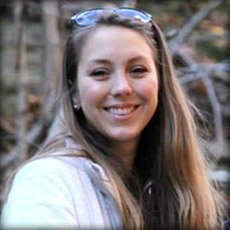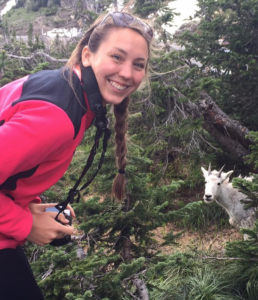Rachel Hopman, PhD Selected as National SHIFT Emerging Leader
 |
Rachel Hopman has been selected as a National SHIFT (Shaping How we Invest For Tomorrow) Emerging Leader. Rachel recently graduated with a PhD from the CNS program and was working with David Strayer. Congratulations Rachel! |
The 2018 Emerging Leaders Program Participants Announced Here
 The Emerging Leaders Program (“ELP”) trains a diverse group of outdoor recreationists to help revitalize conservation
by making it relevant to all Americans. In conjunction with The Teton Science Schools,
participants receive three days of training in advance of The SHIFT Festival, which
prepares them to help lead the proceedings.
The Emerging Leaders Program (“ELP”) trains a diverse group of outdoor recreationists to help revitalize conservation
by making it relevant to all Americans. In conjunction with The Teton Science Schools,
participants receive three days of training in advance of The SHIFT Festival, which
prepares them to help lead the proceedings.
Out of more than 150 applicants from around the country, 30 were accepted into The 2018 Emerging Leaders Program. By their own identification, this year’s cohort is 40% White, 16% Latinx, 16% Black, 13% Indigenous/Native American, 10% Asian American, and 3% Indian American. Their work includes academic research on the benefits of time outside, expeditions for veterans with disabilities, urban planning, healthcare, storytelling and personal narrative. Hailing from 16 states, they’ll converge in Jackson on October 12 to prepare for integration into The 2018 SHIFT Festival, which begins October 16.
|
“This year’s class of Emerging Leaders embodies our goal,” said Christian Beckwith, the program’s Director. “We envision an alliance of Americans from all cultures, experiences and perspectives united behind a passion for place—and committed to its protection. “Only by representing the breadth of the American experience will we be able to guarantee the health and wellbeing of our public lands.” Rachel currently researches the effects of physical activity on cognition as a postdoctoral research associate at the Center for Cognitive and Brain Health. Rachel recently completed a doctoral program at the University of Utah, where she engaged in research determining the cognitive benefits from spending time in nature. At Utah, Rachel studied the neurological changes from multiple days spent in nature and found that outdoor exposures improve neural functioning and cognition. Rachel and her research team used neurophysiological tools and psychological measurements to study brain behavior in wild places around Utah, including ruins left by Ancestral Puebloans in southern Utah and rivers winding through dinosaur lands in northern Utah. Like the participants that she measured, Rachel found peace through exploring nature during her free time. Rachel plans to continue researching the health benefits of physical activity in outdoor environments and exploring the natural land of New England. |
Rachel Hopman, 26 |

